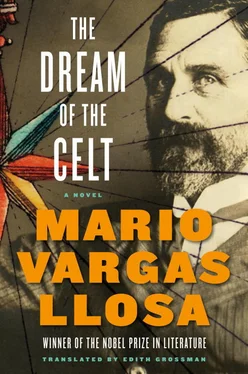Charlie was the first of the servants to return, dripping water. “Go for Dr. Salabert,” Roger ordered, not in French but in Lingala. Dr. Salabert was one of two physicians in Boma, the old slave-trade port—it was called Mboma then—where, in the sixteenth century, Portuguese traffickers from the island of São Tomé came to buy slaves from the tribal chiefs of the vanished Kingdom of the Kongo, transformed now by the Belgians into the capital of the Congo Free State. Unlike Matadi, in Boma there was no hospital, only a dispensary staffed by two Flemish nuns for emergency cases. The doctor arrived half an hour later, shuffling his feet and leaning on a cane. He was younger than he seemed, but the harsh climate, and especially alcohol, had aged him. He looked like an old man and dressed like a vagabond. His high shoes had no laces and his vest was unbuttoned. Even though the day was just beginning, his eyes were bloodshot.
“Yes, my friend, malaria, what else would it be. What a fever. You know the treatment: quinine, abundant fluids, a diet of broth and biscuits, and lots of blankets to sweat out the infections. Don’t even dream of getting up before two weeks. And certainly not of going on a trip, not even to the corner. Tertian fevers demolish the organism, as you know all too well.”
It wasn’t for two but three weeks that he was devastated by fevers and fits of shivering. He lost twenty pounds, and on the first day he could stand, he took a few steps and fell to the floor exhausted, in a state of weakness he did not recall having felt before. Dr. Salabert, staring into his eyes, warned him in a cavernous voice and with acid humor:
“In your condition it would be suicide to go on that expedition. Your body is in ruins and would not survive even a crossing of the Crystal Mountains, much less several weeks of living outdoors. You wouldn’t even reach Mbanza-Ngungu. There are faster ways to kill yourself, Consul: a bullet in the mouth or an injection of strychnine. If you need them, you can count on me. I’ve helped several people undertake the great journey.”
Roger telegraphed the Foreign Office that the state of his health obliged him to postpone the expedition. And since the rains made the forests and river impassable then, the expedition to the interior of the Congo Free State had to wait a few more months that would eventually turn into a year. Another year, recovering very slowly from the fevers and trying to regain the weight he had lost, picking up the tennis racket again, swimming, playing bridge or chess to pass the long nights in Boma, while he resumed his tedious consular tasks: making note of the ships that arrived and departed, the goods the merchant ships of Antwerp unloaded—rifles, munitions, chicote whips, wine, holy pictures, crucifixes, colored glass beads—and the ones they carried to Europe, the immense stacks of rubber, ivory, and animal skins. This was the exchange that in his youthful imagination was going to save the Congolese from cannibalism and from the Arab merchants of Zanzibar who controlled the slave trade, and open the doors of civilization to them!
For three weeks he was laid low by malarial fevers, at times delirious, taking drops of quinine dissolved in herbal infusions that Charlie and Mawuku prepared for him three times a day—his stomach tolerated only broth and pieces of boiled fish or chicken—and playing with John, his most loyal companion. He did not even have the energy to concentrate on reading.
During this forced inactivity, Roger often thought about the expedition of 1884 under the leadership of his hero, Henry Morton Stanley. He had lived in the forests, visited countless indigenous villages, made camp in clearings surrounded by stockades of trees where monkeys screeched and wild beasts roared. He was tense and happy in spite of the bites of mosquitoes and other insects, against which rubbing with camphorated alcohol was useless. He swam in lagoons and rivers of dazzling beauty with no fear of crocodiles, still convinced that by doing what they were doing, he, the four hundred African porters, guides, and assistants, the twenty whites—English, German, Flemish, Walloon, French—who made up the expedition, and, of course, Stanley himself, constituted the tip of the lance of progress in this world where the Stone Age that Europe had left behind many centuries earlier was only just beginning to be visible.
Years later, in the visionary half-sleep of fever, he blushed to think how blind he had been. He had not even been aware, at first, of the reason for the expedition led by Stanley and financed by the king of the Belgians, then considered—by Europe, the West, the world—to be a great humanitarian monarch bent on exterminating the social degradations of slavery and cannibalism and freeing the tribes from the paganism and servitude that kept them in a feral state.
It would be another year before the great Western powers at the Berlin Conference of 1885 granted Leopold II the Congo Free State, more than a million square miles—eighty-five times the size of Belgium—but the king of the Belgians had already begun to administer the territory they were going to give him so he could put his redemptive principles into practice with the estimated twenty million Congolese believed to inhabit it. The monarch with the combed beard had contracted the great Stanley to that end, guessing, with his prodigious aptitude for detecting human weaknesses, that the explorer was equally capable of great deeds and formidable villainies if the prize was on a level with his appetites.
The apparent reason for the 1884 expedition in which Roger served his apprenticeship as an explorer was to prepare the communities scattered along the banks of the Upper, Middle, and Lower Congo, in thousands of miles of dense jungles, gorges, waterfalls, and mountains thick with vegetation, for the arrival of the European merchants and administrators that the International Congo Society (AIC), presided over by Leopold II, would bring in once the Western powers granted him the concession. Stanley and his companions had to explain to the half-naked chieftains, tattooed and feathered, sometimes with thorns in their faces and arms, sometimes with reed funnels on their penises, the benevolent intentions of the Europeans: they would come to help them improve their living conditions, rid them of deadly plagues such as sleeping sickness, educate them, and open their eyes to the truths of this world and the next, thanks to which their children and grandchildren would attain a life that was decent, just, and free.
I wasn’t aware because I didn’t want to be aware , he thought. Charlie had covered him with all the blankets in the house. In spite of that and the blazing sun outside, the consul, curled up and freezing, trembled beneath the mosquito net like a sheet of paper. But worse than being a willing blind man was finding explanations for what any impartial observer would have called a swindle. Because in all the villages reached by the expedition of 1884, after distributing beads and trinkets, and then the aforementioned explanations made by interpreters (many of whom could not make themselves understood by the natives), Stanley had the chiefs and witch doctors sign contracts, written in French, pledging to provide manual labor, lodging, guides, and food to the officials, agents, and employees of the AIC in the work they would undertake to achieve the goals that inspired the Society. They signed with Xs, lines, blots, drawings, without a word and without knowing what they were signing or what signing was, amused by the necklaces, bracelets, and adornments of colored glass they received and the little swallows of liquor with which Stanley invited them to toast their agreement.
They don’t know what they’re doing, but we know it’s for their good and that justifies the deceit , the young Roger Casement thought. What other way was there to do it? How could they give legitimacy to future colonization with people who could not understand a word of those “treaties” in which their future and the future of their descendants was placed under obligation? It was necessary to give some legal form to the enterprise the Belgian monarch wanted to realize by means of persuasion and dialogue, unlike others carried out with blood and fire, invasions, assassinations, and plunder. Wasn’t this peaceable and civil?
Читать дальше












